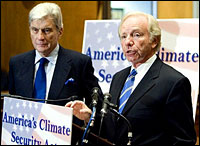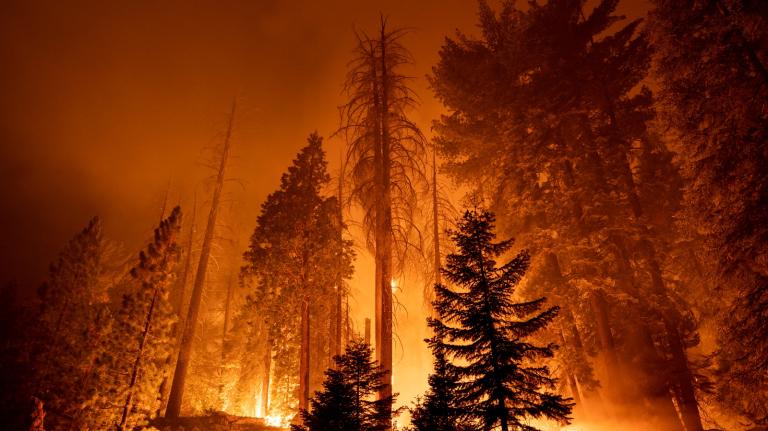 After months of hearings, haggling, and revision, a climate change bill will reach the floor of the Senate this week.
After months of hearings, haggling, and revision, a climate change bill will reach the floor of the Senate this week.
The showdown over the Lieberman-Warner Climate Security Act (CSA) marks the first time the full chamber has focused on a dedicated piece of global warming legislation since 2005, when the McCain-Lieberman climate bill was voted down for a second time.
Sen. John McCain played a starring role in that episode. But it seems if he can’t be the star, he won’t bother with so much as a walk-on part: On Wednesday, he said he wouldn’t be returning to Washington for debate or voting on the bill, though he criticized the legislation for not including enough support for the nuclear power industry. Barack Obama and Hillary Clinton may not show up either, busy as they are in the lead-up to the last two Democratic primaries on Tuesday.

That leaves center stage to the bill’s two lead sponsors, Sens. Joe Lieberman (I-Conn.) and John Warner (R-Va.), and to Barbara Boxer (D-Calif.), who ushered the bill through the Senate Environment and Public Works Committee that she chairs. Boxer is cosponsor of a tougher climate bill with Sen. Bernie Sanders (I-Vt.), but she’s now thrown her weight behind the CSA because it has broader support and a better chance of passing.
Though Boxer has worked to strengthen the bill, she says it’s still not as strong as she’d like. “This represents a consensus document,” she said at a recent press conference. “It’s not everything that Sens. Lieberman, Warner, and Boxer want. It’s the best we could do.” During floor debate, she plans to push for stricter emission targets and a greater percentage of auctioned emission permits, and she has threatened to pull the bill if it’s weakened, as has Senate Majority Leader Harry Reid (D-Nev.).
Many senators will be offering amendments, so attempts to water down the bill are sure to come, along with efforts to toughen it. Meanwhile, James Inhofe (R-Okla.), the Senate’s most notorious global-warming denier, will be trying to scuttle the bill altogether.
Where it all begins
The latest version of the Climate Security Act, unveiled on May 21, has some new components that stem from negotiations between Boxer, the bill’s sponsors, and other senators, but it’s substantially the same legislation that was passed out of the Environment and Public Works Committee last December. It’s not as strong as most activists and climate scientists would like, but strong enough that many of them are cheering it as a big step forward.
The bill calls for a cap on greenhouse-gas emissions starting in 2012, with electric utilities, refineries, and the industrial and transportation sectors required to cut their emissions 19 percent below 2005 levels by 2020 and a 71 percent by 2050. Other provisions of the bill are expected to reduce greenhouse gases from additional emitters 66 percent by 2050.
For the primary industries covered, emissions cuts would be achieved through a cap-and-trade system that would let polluting entities buy and sell the right to emit carbon. About 20 percent of emissions credits would be auctioned initially; the rest would be given out free to emitters and states. The percentage of credits auctioned instead of given away would increase gradually over time. (Hillary Clinton and Barack Obama have both advocated for auctioning 100% of credits from the beginning, a position widely supported by enviros.)
Some new provisions in the bill are intended to help consumers deal with any increases in energy prices. There’s an $800 billion consumer tax relief package and a $911 billion allowance to local electricity and gas utilities to help them cushion consumers from price swings, invest in renewables, and promote efficiency. This would all be paid for by the revenue from auctioning emissions credits, expected to total $3.3 trillion over the life of the bill. Funds from the auction would also go to worker transition programs, block grants to local governments for energy-efficiency programs, international adaptation programs, and deficit reduction.

“I think this bill has been strengthened enormously,” said Boxer. “This will make people whole after we move toward a clean energy future.”
The biggest change in the new version of the bill is a cost-containment mechanism, or “emergency off-ramp,” which would automatically release additional emission credits onto the market if the price of credits hit $22 to $30 by 2012, adjusted for inflation after that. The additional credits would be borrowed from future allowances and auctioned off, with the proceeds used for direct emissions reductions. This falls short of the “safety valve” provision so anathema to enviros, but not short enough for comfort. Critics of the off-ramp argue that the price cap is too low and that it would remove the predictability that drives long-term investment.
Others see this new component as an important means of attracting more votes. Paul Bledsoe, director of communications and strategy for the National Commission on Energy Policy, a nonpartisan think tank, called it a “good-faith effort to try to broaden the support for the legislation.”
Said Bledsoe, “This whole journey of creating an economy-wide cap-and-trade bill is moving toward greater and greater consensus.”
The fight ahead
But senators and other interested parties are still far from consensus on what this bill should contain.
Lobbyists for the energy industry are complaining about the 11th-hour release of the new language. “We have not had time to look closely at the legislation to understand fully what it means for American consumers and households,” said Scott Segal, co-chair of the federal government relations branch of the law firm Bracewell & Giuliani LLP and director of the Electric Reliability Coordinating Council, which lobbies on behalf of power companies like Southern Co. and Duke Energy Corp. “The Lieberman-Warner bill is the first bet-the-economy proposition that we may have seen in modern environmental law.”
Whether or not the energy industry feels ready, the bill is advancing to the Senate floor, where four big issues are likely to stoke fiery debate: cost containment, nuclear energy, the system for distributing carbon credits, and what to do about states that have already imposed emissions standards.
Though the bill now has a cost-containment provision, it’s weaker than the “safety valve” some senators would like to see added, which, if emission-permit prices reached a certain set level, would flood more permits onto the market — new permits, not just ones borrowed from future allocations. Jeff Bingaman (D-N.M.) and Arlen Specter (R-Pa.), the Senate’s most outspoken advocates for a safety valve, have sponsored their own industry-friendly legislation that calls for one, but it hasn’t gained traction. A spokesperson for Bingaman’s office said he’s considering the new draft of the Climate Security Act and hasn’t decided if its cost-containment mechanism is adequate. Boxer opposes a safety valve, as do most enviros.
Nuclear power will be another sticking point. Lieberman and Warner are already circulating a proposed amendment [PDF] that would add more explicit support for nukes, taking the money from a general fund for any low- or no-carbon technology. McCain favors such a change, as do Sens. Johnny Isakson (R-Ga.) and Sen. Lindsey Graham (R-S.C.); Graham has said that the omission of a nuclear title would be “deal killer.” Meanwhile, Boxer has said that the inclusion of such a provision would be a deal-breaker for her.
There’s also a lot of disagreement over how to disperse carbon credits. Industry wants them passed out free of charge. An array of prominent Democrats, energy analysts, and enviros would like to see 100 percent of them auctioned off, so companies are paying for the right to pollute, with the proceeds going to things like renewable energy R&D, green jobs programs, and more relief for low-income Americans. Sen. Bob Corker (R-Tenn.) has raised questions about whether credits should be allocated to entities like state governments. He said in a recent hearing that he will introduce an amendment to ensure that the bill “returns all revenues back to citizens.”
A fourth contentious issue will be whether states are allowed to have stronger emissions standards than the federal government. A number of states, most notably California, have already moved to restrict greenhouse-gas emissions. Lieberman-Warner currently allows states to retain their own standards, but excludes those that do so from some incentive programs for utilities and state and local governments. Industry groups are concerned that differing state regulations would make reducing emissions more difficult for companies that operate across state lines, but many green groups and progressive state leaders would like to see ambitious states allowed to continue their efforts.
Meanwhile, Sen. George Voinovich (R-Ohio) is circulating a much weaker alternative climate bill, which industry lobbyists from Segal’s coalition helped author. His plan calls for voluntary rather than mandatory emissions cuts, tax incentives for coal and nuclear power, and the introduction of a cap-and-trade system only as a back-up measure. Jeremy Symons, director of the climate change campaign for the National Wildlife Federation, has called it “the bill to nowhere,” a sentiment widely echoed by greens inside and outside the Senate. But provisions from his bill are likely to come up during debate over Lieberman-Warner. Some Democrats, including Sen. Ben Nelson of Nebraska, have said they’re considering this alternative bill.
The green challenge
Green groups, for their part, will be pushing for a tougher emissions target of 80 percent below 1990 levels by 2050 — the level the Intergovernmental Panel on Climate Change indicates is needed to avoid the worst effects of climate change. They’re also unhappy with the $3.4 trillion in carbon credits that Lieberman-Warner would distribute free to oil, gas, coal, and other polluting industries. Obama and Clinton have also called for an 80 percent emissions cut and no freebie carbon credits.
Twenty major green groups, including the Sierra Club, Natural Resources Defense Council, Environmental Defense Fund, Union of Concerned Scientists, National Wildlife Federation, and the League of Conservation Voters, issued a joint statement following the release of the new version of the bill, expressing support but calling for improvements. “The best chance for progress this year on federal global warming pollution limits is for the Senate to strengthen and pass the Climate Security Act,” reads their official statement.
Some of those same groups, including NRDC and NWF, joined corporations like GE and Exelon in signing a separate letter that calls on senators to vote “yes” on the bill.
“We’re going to be working to strengthen it, and to pass it,” said Dan Lashof, director of the climate center at NRDC. “We think it’s a very strong start on the emissions reductions that we need, and we really can’t afford to waste any time here.”
Friends of the Earth is also calling for improvements, but has been much more strident in saying the bill should be opposed if it’s not significantly strengthened. “The Lieberman-Warner bill comes nowhere close to doing what scientists say we must to have a shot at avoiding catastrophic outcomes,” said FOE President Brent Blackwelder. Greenpeace and Clean Air Watch have both aligned with FOE’s “Fix It or Ditch It” campaign.
Progress, regardless of outcome
Boxer has said she believes the bill in its current form stands a decent chance of passing. She pointed to recent evidence that many senators of both parties are ready to act against the climate threat: In mid-May, Sen. Jim DeMint (R-S.C.) proposed an amendment to a budget bill that would have instructed Congress to hold off on enacting cap-and-trade legislation until China and India take more steps themselves to fight climate change. Sixty-one senators voted to kill the amendment — including 12 Republicans. The Climate Security Act needs just 60 votes to overcome a filibuster.
Even if Lieberman-Warner does clear the Senate, there would be a second battle in the House, which is significantly behind on climate legislation. And if a bill passed both branches of Congress, it would still face the almost-certain veto of President Bush, who remains hostile to a mandatory emissions cap.
No matter how it all turns out, serious deliberation of climate legislation is itself a sign of progress.
“We have to start the debate, and this is a very good place to start it,” said Boxer. “We may well pass a very good bill, we may get derailed. But however far we take it, it’s very important to start now. Landmark bills don’t pass in a day or a week.”


